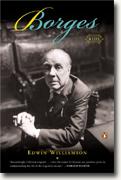Borges
Edwin Williamson
book reviews:
· general fiction
· chick lit/romance
· sci-fi/fantasy
· graphic novels
· nonfiction
· audio books
· author interviews
· children's books @
curledupkids.com
· DVD reviews @
curledupdvd.com
newsletter
win books
buy online
links
home
for authors
& publishers
for reviewers

 |
Borges: A Life Edwin Williamson Penguin Paperback 592 pages July 2005 |
|
Jorge Luis Borges, the great Argentinean writer, led a fascinatingly diverse life almost entirely within the city limits of Buenos Aires. Buenos Aires was, in the early twentieth century, one of the largest and most cosmopolitan cities on the planet, and so it is fair to say that Borges experienced numerous worlds without needing to leave home. Born in 1899, he was bilingual from the first, as his grandmother was British. His parents were in conflict over Argentinean politics, which perhaps influenced Borges’ seeming non-partisanship in his writing.
For instance, there is the matter of Borges’ early love affair with Norah Lange, a Norwegian-Argentinean red-haired beauty who obsessed Borges for nearly a decade in the 1920s and ’30s. Many of Borges’ early poems and stories were shaped by his affair with Lange, and more, by her jilting of him in favor of Oliverio Girondo. Also, there is the matter of Borges’ politics: throughout his life he consistently opposed the conservatives, whom he thought barbaric (and who, before World War II, were fascists). Though later Borges would insist that his writing was never political, in the ’20s and ’30s he often wrote essays, reviews and editorials from a strongly liberal perspective. What Williamson does best is bust Borges out of the “magical realism” jail he has been placed in by his North American critics. Born in a tough neighborhood of Buenos Aires, the young Borges witnessed the knife fights and gang battles that provided the material for so much of his work (both early and late)—work, however, that is little known in the Anglophone world, at least until recently with the publication of Andrew Hurley’s translation of Brodie’s Report. This is not to say that Borges wasn’t interested from early on in experiments designed to extend the range of fictional narrative. He seems to have immediately grasped the relationship between history, memory and narrative and the fact that memory and its reportage often serve to “smooth out” or justify history. Borges’ great achievement was to rough up or striate our understanding of memory and history. For this, curiously, Borges never won the Nobel Prize, though he was short-listed for many years. The reason for not winning the Prize was probably due to the fact that Borges never published a novel and even with his many short stories, he was never an overtly liberationist writer (which is what the Prize committee generally rewards). He did attempt to write novels and several of his greatest stories are in fact synopses or “fake reviews” of novels he seems to have wanted to write. The problem for Borges seems to have been his conception of the novel as “a representation of a time labyrinth”—a conception that served him so well and so famously in his stories seems to have bogged him down in longer works. Instead, the top Prize went to Marquez in 1982, whose novel One Hundred Years of Solitude is clearly in debt to the notion of a “time labyrinth.” Williamson’s biography is lucid, comprehensive and deeply informed, not only by the life and work of Borges but of all those in his orbit. While Williamson is clearly fascinated by the events and people that shaped Borges’ work, he does not neglect the peripheral material that makes a great life great reading. Originally published on Curled Up With A Good Book at www.curledup.com. © Brian Charles Clark, 2005 |
| Books by Jorge Luis Borges: |
|
|
|
 Click here to learn more about this month's sponsor! |
|
| fiction · sf/f · comic books · nonfiction · audio newsletter · free book contest · buy books online review index · links · · authors & publishers reviewers |
|
| site by ELBO Computing Resources, Inc. | |
 Indeed, if there is a problem with Williamson’s Life, it is the reduction of Borges’ life, character and work to this conflict between his parents. Williamson frequently tries to psychoanalyze the life and work in terms of this conflict and, as far as it goes, this provides insight. But did his parents really shape Borges’ entire life? The evidence provided by Williamson himself indicates otherwise.
Indeed, if there is a problem with Williamson’s Life, it is the reduction of Borges’ life, character and work to this conflict between his parents. Williamson frequently tries to psychoanalyze the life and work in terms of this conflict and, as far as it goes, this provides insight. But did his parents really shape Borges’ entire life? The evidence provided by Williamson himself indicates otherwise.